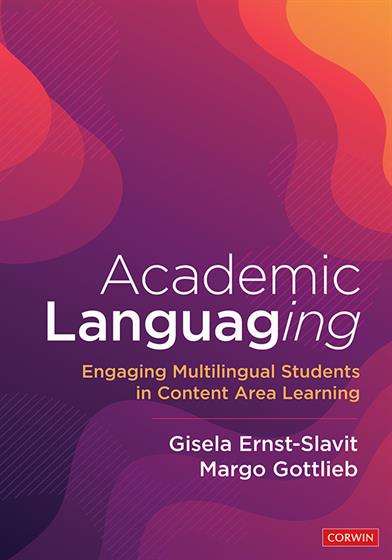Hands-on, Practical Guidance for Educators
From math,
literacy, equity, multilingual learners, and SEL, to assessment, school counseling,
and education leadership, our books are research-based and authored by experts
on topics most relevant to what educators are facing today.

Academic Languaging
Foreword by Jeff Zwiers
Empower multilingual learners and foster meaningful, culturally sustaining instruction with strategies to integrate language and content learning while nurturing student engagement, voice, and agency.
- Grade Level: K-12
- ISBN: 9781071956076
- Published By: Corwin
- Year: 2025
- Page Count: 270
- Publication date: July 15, 2025
Review Copies
Description
Rethink how academic languaging can transform content area teaching
For years, the teaching of content-based academic language to multilingual learners has focused on formulas, vocabulary lists, and sentence patterns—often sidelining students’ linguistic and cultural strengths. Gisela Ernst-Slavit and Margo Gottlieb address these challenges by embracing academic languaging, an active, collaborative student-driven process. Academic Languaging offers strategies to integrate language and content learning while fostering student engagement, voice, and agency.
Dedicated chapters on academic languaging for Language Arts, Mathematics, Social Studies, and Science highlight the dimensions of disciplinary language for each subject and provide strategies for moving learning forward with multilingual learners. Additional features include:
- “Stop and Think” prompts to help educators connect new ideas with their instructional settings
- Prompts at the end of each chapter to encourage deeper thinking and application of the material
- Multilingual examples to mirror the varied classroom settings in the U.S. and beyond.
The ultimate resource for educators committed to empowering multilingual learners and fostering meaningful, culturally sustaining education, Academic Languaging ensures multilingual learners comprehend academic content and thrive as confident, autonomous drivers of their own learning.
Author(s)

Gisela Ernst-Slavit

Margo Gottlieb
Margo Gottlieb, Ph.D., has been a bilingual teacher, coordinator, facilitator, consultant, and mentor across K-20 settings. Having worked with universities, organizations, governments, states, school districts, networks, and schools, Margo has co-constructed linguistic and culturally sustainable curriculum and reconceptualized classroom assessment, policy, and practice. As co-founder and lead developer of WIDA at the University of Wisconsin-Madison in 2003, Margo has helped design and contributed to all the editions of WIDA’s English and Spanish language development standards frameworks and their derivative products. She has been appointed to national and state advisory boards, served as a Fulbright Senior Scholar, and was honored by the TESOL International Association in 2016 for her significant contribution to the field. An avid traveler, Margo has enjoyed keynoting and presenting across the United States, territories, and 25 countries. Having authored, co-authored, or co-edited over 100 publications, including 22 books, Margo's 3rd edition of Assessing Multilingual Learners: Bridges to Empowerment (2024) and Collaborative Assessment for Multilingual Learners and Teachers: Pathways to Partnerships (with A. Honigsfeld, 2025) are the latest additions to her Corwin compendium.
In 2025, Margo was inducted into the Multilingual Education Hall of Fame.
Table of Contents
Foreword by Jeff Zwiers
Acknowledgments
About the Authors
List of Figures and Companion Website Contents
Preface
Chapter 1: Moving from Academic Language to Academic Languaging
Chapter 2: Anchors for Teaching Multilingual Learners
Chapter 3: Academic Languaging for Language Arts
Chapter 4: Academic Languaging for Mathematics
Chapter 5: Academic Languaging for Social Studies
Chapter 6: Academic Languaging for Science
Chapter 7: Taking a Dynamic Stance: Academic Languaging for Multilingual
References
Index
Reviews
“What an exciting way to approach languaging in the content areas! Gisela’s and Margo’s book lays the groundwork for looking at language, literacy, and core content through the actions of multilingual learners and their teachers. They show how multilingualism is at the heart of multilingual learners’ identities and how multimodalities can open doors for increasing their access to content and showing evidence for learning. Through model texts, they illustrate how to make dimensions of language come to life to promote student engagement. They showcase academic languaging for building teacher and peer relationships, and for applying technology to advance learning in math, science, social studies, and language arts. This book is a must for ESL/ELD and dual language teachers, programs, and school administrators.”Margarita Espino Calderón, Professor Emerita/Senior Research Scientist
Johns Hopkins University
"Drs. Margo Gottlieb and Gisela Ernst-Slavit’s original series has always been my go-to resource for understanding academic language and its application to curriculum, instruction, and assessment. The reconceptualization of academic language in this new edition brings educators to the most contemporary, research-informed, and evidence-based understanding of academic languaging as an active process that honors multilingualism and invites students to use their full linguistic repertoires across various contexts. The chapter-by-chapter guidance across the core content areas prompts readers to critically examine how students’ rich cultural and linguistic heritages and experiences are authentically embedded in all learning opportunities while also suggesting actionable steps to support multilingual learners’ self-expression and agency. A must-read for all educators!"Andrea Honigsfeld
Professor, Author Consultant, Molloy University, NY
"As educators, we want to embrace students’ languages, cultures, lived experiences, interests, perspectives, and multiliteracies. How can we do this and simultaneously support them to master academic language across the content areas? Scholars Ernst-Slavit and Gottlieb’s latest contribution brilliantly show us how to engage all language learners, put their language assets and cultural perspectives front and center, and support them as empowered autonomous learners."Debbie Zacarian
Director, Zacarian & Associates and Author
"In this timely and vital new edition, Ernst-Slavit and Gottlieb reconfigure academic language for an era defined by artificial intelligence, heightened student stress, and the embrace of asset-based approaches, such as translanguaging pedagogy. The book is packed with essential updates for today's classrooms, including:
• Rich strategies for digital literacy and multimodal learning,
• Creative approaches to movement, visual arts, and hands-on learning,
• Practical ways to build student voice and agency, and
• Clear connections between social-emotional learning and academic success.
Few scholars have impacted multilingual education as profoundly as Ernst-Slavit and Gottlieb. The authors provide both the research foundation teachers need to understand why these approaches work and the practical tools to implement them successfully. Through carefully scaffolded instruction and meaningful engagement with content, multilingual learners can thrive with rigorous academic work from their first day in the classroom."
Andrea B. Hellman"In this timely and vital new edition, Ernst-Slavit and Gottlieb reconfigure academic language for an era defined by artificial intelligence, heightened student stress, and the embrace of asset-based approaches, such as translanguaging pedagogy. The book is packed with essential updates for today's classrooms, including:
• Rich strategies for digital literacy and multimodal learning,
• Creative approaches to movement, visual arts, and hands-on learning,
• Practical ways to build student voice and agency, and
• Clear connections between social-emotional learning and academic success.
Few scholars have impacted multilingual education as profoundly as Ernst-Slavit and Gottlieb. The authors provide both the research foundation teachers need to understand why these approaches work and the practical tools to implement them successfully. Through carefully scaffolded instruction and meaningful engagement with content, multilingual learners can thrive with rigorous academic work from their first day in the classroom."
Professor of TESOL-Linguistics, Missouri State University
“This book is a much-needed collection for teachers and teacher educators interested in language and content integration for multilingual learners. By focusing on going beyond the construct of academic language to considering ‘academic languaging’, Ernst-Slavit and Gottlieb offer ways to support and incorporate multimodalities and multiple means of expression into instruction to optimize multilingual learners’ content learning. One significant feature is the inclusion of model texts demonstrating how language features function within specific content areas. These texts serve as tools to support multilingual learners in their oral language and literacy development. Like everything that Gottlieb and Ernst-Slavit do, this is another wonderful and practical contribution to the TESOL field!”Luciana C. de Oliveira, Associate Dean for Academic Affairs and Graduate Studies/Professor
Virginia Commonwealth University
"Academic Languaging: Engaging Multilingual Students in Content Area Learning arrives at a pivotal moment for K-12 education, offering educators a timely and transformative approach for supporting multilingual learners. With the notion of “academic language” evolving to acknowledge the dynamic concept of “languaging,” this book redefines how we view and approach language in content classrooms. Academic languaging moves beyond the constraints of traditional school language, embracing students’ diverse linguistic and cultural assets as integral to learning. Authors Ernst-Slavit and Gottlieb provide a practical and insightful guide for teachers, administrators, and language specialists, emphasizing the importance of creating learning environments that honor students’ backgrounds and encourage agency. The book’s structured strategies and content-specific chapters offer actionable methods for embedding academic language through multimodal, culturally relevant practices. As multilingualism becomes the norm, Academic Languaging stands as an essential resource, advocating for education that empowers students to leverage their whole linguistic repertoire. It’s a must-read for any educator committed to transforming their classroom into a space of active, meaningful learning for all students."Amelia Larson
Chief Academic Officer, Summit K12
"Congratulations to Drs. Ernst-Slavit and Gottlieb and their new book replete with essential academic content and pragmatic applications for educators of multilingual learners to use in their everyday work. This book moves the field of multilingual education forward by addressing both the complexities of the construct ‘academic language’ and its prior limitations and definitions, and building into the dynamic concept of ‘academic languaging’, an action-oriented approach to schooling that underscores the interactive nature of how language is used in multiple formats and modalities. Readers will find the ‘stop and think’ features, imagery, model texts, and tables essential as they engage in their own exploration of language and languaging. I cannot wait to use this book with my students and to share this work with colleagues."Maria Coady
Distinguished Professor in Educational Equity at North Carolina State University
"This insightful book invites all educators, monolingual or multilingual —particularly future and in-service teachers, coaches, administrators, and teacher educators—to embrace all the languages and cultural experiences multilingual students bring to school as they support their development of “academic languaging”. The examples provide practical ideas for educators on the “what” it is and "how” to create languaging opportunities for multilingual learners to make meaning of and access content area knowledge using their complete language systems and cultural perspectives. The authors also include thought-provoking questions embedded throughout the chapters to help readers interact with new ideas and construct meaning grounded in their contexts and experiences. This is a must-read for all educators who want to embrace a social justice stance and create a more flexible, and empowering environment for multilingual students."Sandra Mercuri
Sandra Mercuri Educational Consultants
"This book engages teachers in a deep examination of the notion of academic language, not as a fixed or static concept, but as a reflection of the dynamic “languaging” practices that are enacted within multilingual schools and communities. It provides rich tools and resources for a variety of classroom contexts, grade levels, and content areas, with concrete examples to help teachers adapt and modify suggested strategies for their own particular settings. Most importantly, it offers an approach to language teaching and learning that honors multilingual learners’ identities and sense of agency, placing them at the center of schooling."Maria Dantas-Whitney
Professor of ESOL and Bilingual Education at Western Oregon University
Review Copies
Related Resources
-
Companion Website
[Site]
Other Titles in: Bilingual/ELL Learners | Teaching Strategies for Diverse Students | Elementary Teaching Methods
Join us for the Visible Learning
Conference in Las Vegas!
Experience groundbreaking research, inspiring speakers,
and transformative networking. Register Now.

